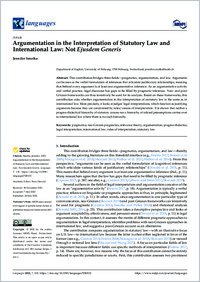Argumentation in the interpretation of statutory law and international law : not ejusdem generis
BLE-BLL
- Smolka, Jennifer Universität Freiburg, Schweiz
- 24.05.2022
Published in:
- Languages. - 2022, vol. 7, no. 2, p. 132
Pragmatics
Neo-Gricean pragmatics
Relevance theory
Argumentation
Pragma-dialectics
Legal interpretation
International law
Rules of interpretation
Statutory law
English
This contribution bridges three fields—pragmatics, argumentation, and law. Arguments
can be seen as the verbal formulation of inferences that articulate justificatory relationships, meaning
that behind every argument is at least one argumentative inference. As an argumentative activity
and verbal practice, legal discourse has gaps to be filled by pragmatic inference. Neo- and post-
Gricean frameworks can thus tentatively be used for its analysis. Based on these frameworks, this
contribution asks whether argumentation in the interpretation of statutory law is the same as in
international law. More precisely, it looks at judges’ legal interpretations, which function as justifying
arguments because they are constrained by rules/canons of interpretation. It is shown that neither a
pragma-dialectical hierarchy of statutory canons nor a hierarchy of related presumptions carries over
to international law where there is no such hierarchy.
can be seen as the verbal formulation of inferences that articulate justificatory relationships, meaning
that behind every argument is at least one argumentative inference. As an argumentative activity
and verbal practice, legal discourse has gaps to be filled by pragmatic inference. Neo- and post-
Gricean frameworks can thus tentatively be used for its analysis. Based on these frameworks, this
contribution asks whether argumentation in the interpretation of statutory law is the same as in
international law. More precisely, it looks at judges’ legal interpretations, which function as justifying
arguments because they are constrained by rules/canons of interpretation. It is shown that neither a
pragma-dialectical hierarchy of statutory canons nor a hierarchy of related presumptions carries over
to international law where there is no such hierarchy.
- Faculty
- Faculté des lettres et des sciences humaines
- Department
- Département d'anglais
- Language
-
- English
- Other electronic version
- License
- License undefined
- Open access status
- gold
- Identifiers
- Persistent URL
- https://folia.unifr.ch/unifr/documents/320548
Statistics
Document views: 57
File downloads:
- languages-07-00132-v3.pdf: 109
